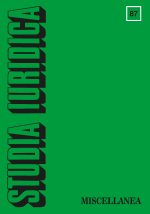PRZYMUS WOBEC PAŃSTWA JAKO PRZESŁANKA NIEWAŻNOŚCI TRAKTATU W ŚWIETLE KONWENCJI WIEDEŃSKIEJ Z 1969 ROKU
THE COERCION OF A STATE AS A GROUND OF THE INVALIDITY OF A TREATY UNDER THE 1969 VIENNA CONVENTION
Author(s): Tomasz Kaminski, Elżbieta KarskaSubject(s): International Law, International relations/trade, Post-War period (1950 - 1989)
Published by: Wydawnictwa Uniwersytetu Warszawskiego
Keywords: invalidity of treaties; coercion of a state; coercion of a representative of a state; threat or use of force; codification of law of treaties;
Summary/Abstract: This article analyses the scope of the coercion of a state as a ground for invalidating a treaty under international law. The coercion of a representative of a state (i.e. duress) is also addressed. The paper presents the notion and the legal limitations of the use of force under international law. It also discusses duress and coercion of a state as grounds for treaty invalidity in an historical perspective. The main purpose of the paper, however, is to present the scope of the concept of the coercion of a state under the 1969 Vienna Convention on the Law of Treaties (VCLT). The article comments on the phrase of Article 52 of the VCLT on the invalidity of treaties that refers to the rules of international law, as embodied in the UN Charter, regarding the threat or use of force in concluding treaties. It considers whether the wording of VCLT articles on coercion as grounds for invalidating a treaty reflects customary rules of international law. The authors also consider a concept raised by certain developing states that coercion comprises not only the threat or use of force but also economic and political pressure. Finally, discussed are the procedures to invoke grounds for treaty invalidity applicable in the case of the coercion of a state.
Journal: Studia Iuridica
- Issue Year: 2021
- Issue No: 87
- Page Range: 214-241
- Page Count: 28
- Language: Polish

